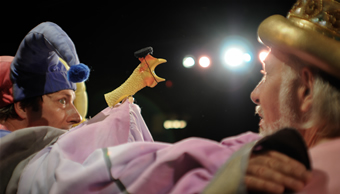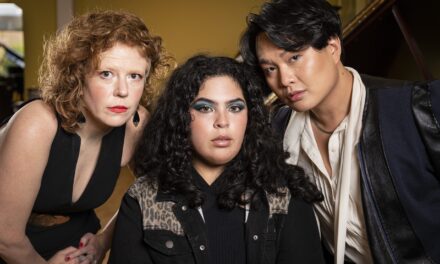You gotta hand it to Randolph Foy, Music Director of the Raleigh Civic Symphony, when it comes to programming, for he cuts his players little slack in terms of new music and/or challenging repertoire as he continues to “grow” his ensembles. The first concert of the season by the RCSA’s big orchestra (85 players, including 50 strings), given in Stewart Theatre on November 16, featured a classic 20th century work that – like many of its library-shelf-mates – turns up infrequently here, in concert. ‘Twas Holst’s The Planets, long prized as a “sonic spectacular” among record (and CD) collectors), and ’twas welcome, mostly; interestingly, it’s being given several more times in the Triangle this year. There was a time in the life of the Raleigh Civic Symphony when producing a piece this large – it calls for two harps, two sets of timpani, supplemental woodwinds, lots of brass, celeste, and a women’s chorus (two, actually) – would have been unthinkable. Overall, it received an impressive reading, although there were some problems here and there. It’s not easy music, and it’s very familiar, thanks to recordings and classical radio stations, so chances are above average that many people in attendance “knew” the music (if not the score, per se). The opening number, “Mars,” was outstanding, and the playing of the solo horn and winds in the truly atmospheric “Venus” was remarkably good. “Mercury,” probably the work’s most difficult section, was shaky, but the brass remained fairly strong, and things coalesced as it went along. There were some smiles of recognition during the “trio” of “Jupiter,” which is a lush setting of what was said to have been Princess Diana’s favorite hymn tune, radiantly projected on this occasion. The concluding numbers serve as a wonderful cap, starting with the mysterious “Saturn,” continuing with the rollicking, happy piece that is “Uranus,” in which the low brass excelled, and ending with what was, at the time the music was composed, the last known planet, “Neptune,” in which Holst incorporates women’s voices. The vocalists, positioned in Stewart’s two main entrance foyers, were members of Peace College’s Chamber Singers, directed by James Smith, and women of the NC State Concert Choir, Randall A. Meder, director.
The short, intermission-less program began with Brahms’ “Tragic” Overture, a welcome change from the more customary fare at colleges and universities, the same composer’s “Academic Festival” Overture. It’s likely that most of the preparation went into the Holst, but in any event the Brahms didn’t come across quite as well. The ensemble in the upper strings was often quite slippery, and at times the attacks rippled from the concertmaster and principal second violin to the back-deskers. As an old stick-waver once explained in somewhat vehement terms, the trick is to watch the maestro’s baton and not count on your neighbors. Foy gained the players’ attention as the piece unfolded, and at the end it was pretty much ok. The shape was sound, the pacing, astute, and there were enough players to provide heartening definition and dynamic contrasts. Incidentally, Foy also wrote the program notes, which were – as is often the case – among the best to be found in this neck of the woods.
Readers who missed this concert have three more shots at The Planets in the Triangle this season, in February, courtesy of the NC Symphony and William Henry Curry. The RCSA’s Chamber Orchestra plays in Stewart at 4:00 p.m. on November 23 – see our calendar for details – and the full orchestra’s spring concert is scheduled for April 18.












